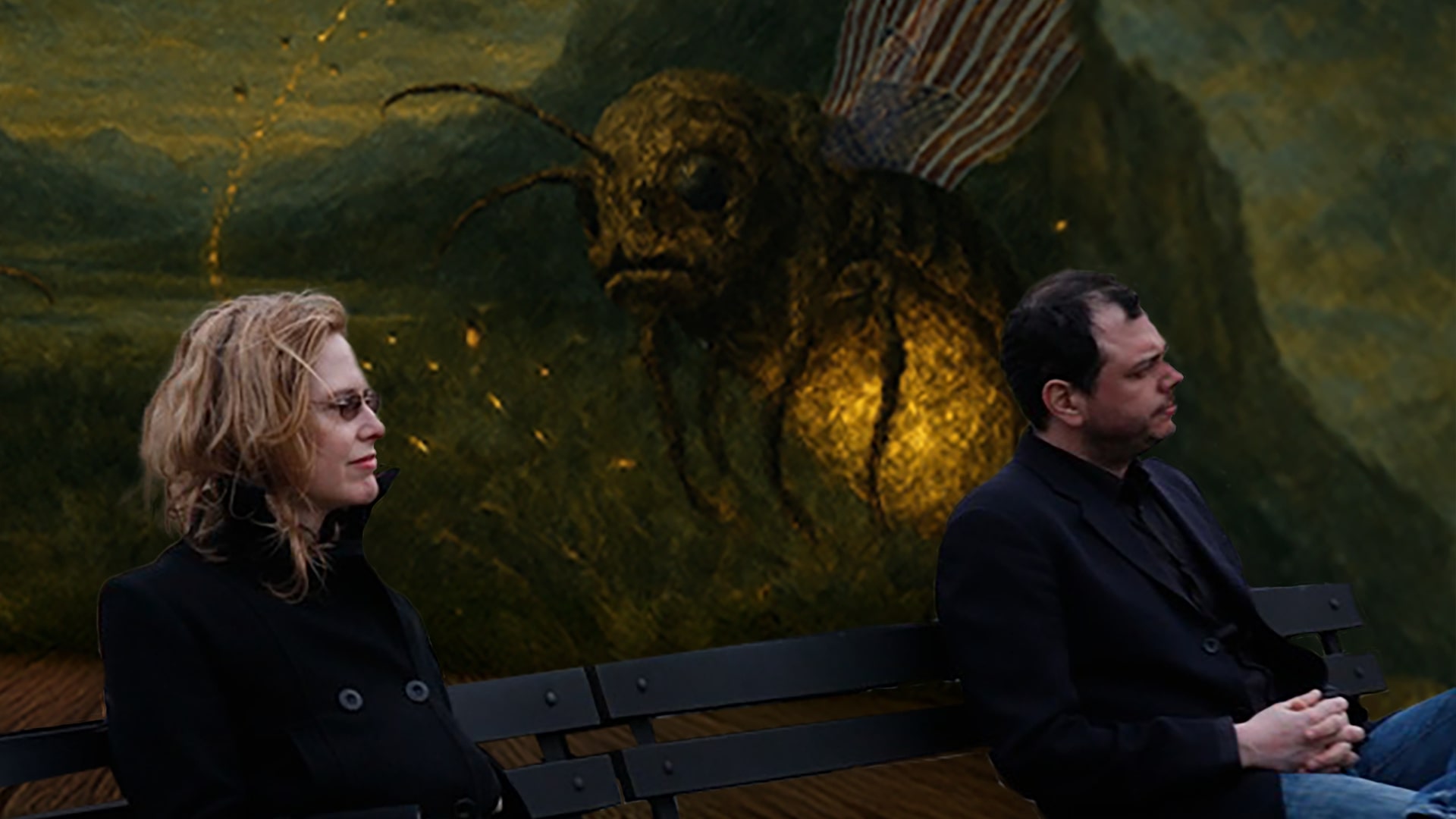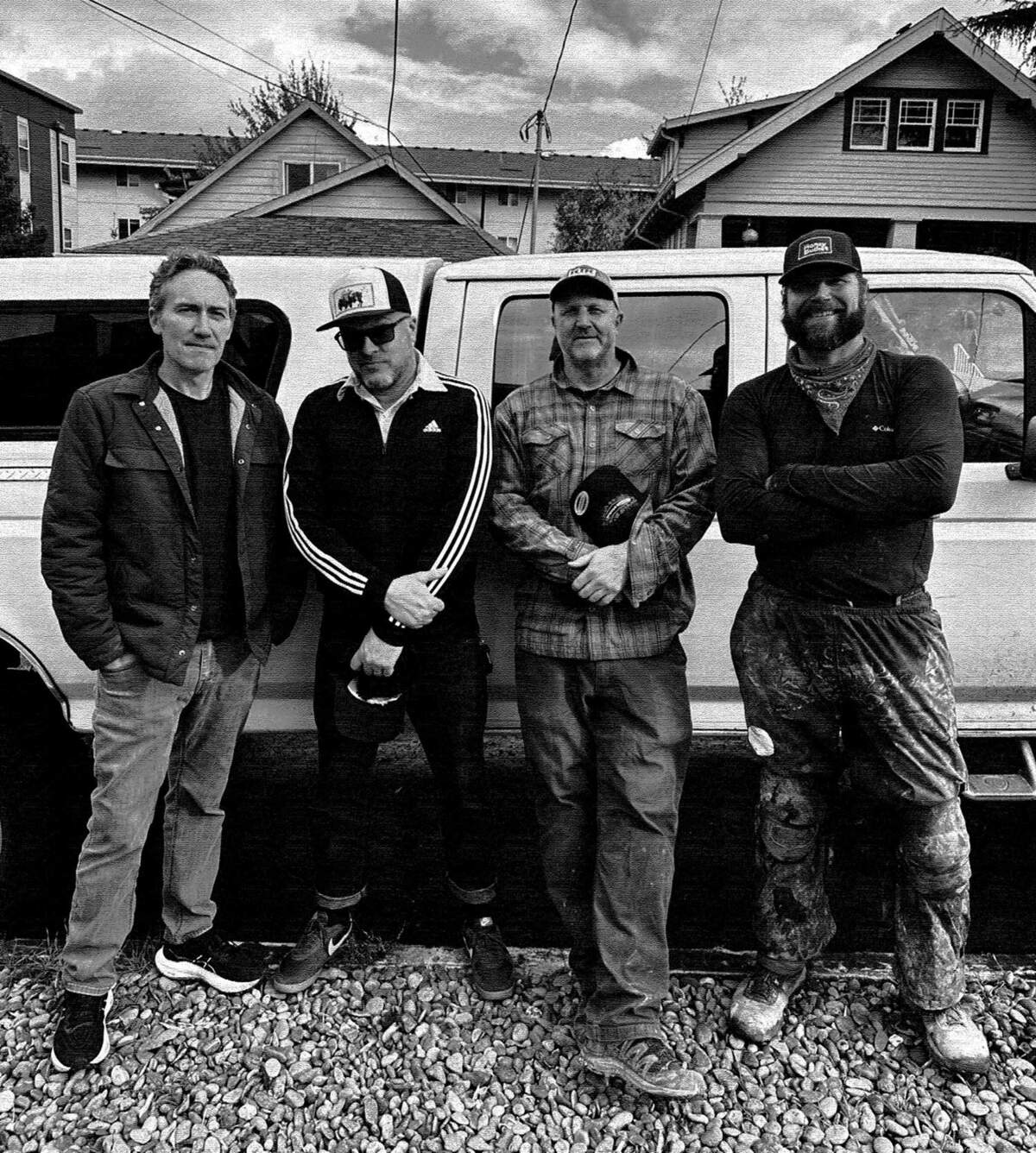The Heavenly States on ‘Fifth of July’: A Band’s Take on Music, Memory, and Modern America
The Heavenly States have always lived on the outskirts of convention, not by rebellion but by constitution. Formed in Oakland in the early 2000s and now shaped by the humid textures of Austin, the band has moved through scenes like weather systems.
Sometimes gentle, often furious, always elemental. Their music reads like coded letters from the margins, filled with bruised idealism, political static, and aching, melodic persistence. There is an amateur ethic at the core. Not in craft, but in devotion. An insistence that making music should remain a personal, high-stakes act rather than a scalable product.
They were cutting triple vinyl records before the vinyl renaissance, grinding out pandemic tracks in home-built studios while others waited for the world to resume. They did not wait. They rarely do. Their songs arrive bent and imperfect, filled with rivets, flaws, and unmistakable humanity. The band has never sounded like a genre, only like themselves. An unpredictable constellation held together by dialogue, friction, and a deep sense of communal self-determination.
Their latest double album is less a comeback than a transmission. A field report from the edge of burnout and belief. These are not songs written to win. They are songs written to survive, to feel through the noise, to light a match in whatever darkness is closing in. It is healing by implication. Anger as testimony. Sorrow that somehow refuses to retreat. If you are still listening, you are already part of it.
Led by core songwriters Genevieve Gagon (keys, violin, vocals) and Ted Nesseth (guitar, vocals), the group is joined by a powerhouse roster of Austin talent: John Olrech and Erik Grostic on bass, and Danny Piccuirro and Jason Toll on drums. Genevieve and Ted’s creative partnership stretches back years, rekindled during the isolation of the pandemic, where they embraced the challenges of home recording. Building gear from scratch, layering parts from separate rooms, and adapting to distance, …
Their new single, ‘Fifth of July,’ is a “day-after danse macabre.” It confronts the familiar holiday with biting clarity, spotlighting the aftermath beneath the fireworks: “All the plastic forks on the fourth of July become the plastic forks on the fifth of July.” The band’s words cut deeper, reflecting on what is often ignored, “We watch a lot, we learn a lot, about the missing daughters.”
For The Heavenly States, this is a moment to hold a mirror to a fractured celebration, describing a landscape marked by “insouciant, flaccid desire” and the detritus of excess. They set a somber stage beneath the gloss of freedom. ‘Fifth of July’ arrives on July 25th via LBM Recordings and it’s a damn reminder that some truths demand to be heard beyond the noise.
So, “Fifth of July”…that whole “day-after danse macabre” thing? Spot on, right? The Fourth is all fireworks and fuzzy feelings, but what messes get left behind when the glitter’s gone and the party’s really over? What’s the “Fifth of July” trying to tell us that we usually just gloss over?
Genevieve Gagon: Well, the forks, man. A signet of the great economic machine of which this event is an opportunity to sell plastic, drugs, and meat. Also, the way we don’t see what we’re trampling over—a field, for example, the home of a wild bee—when we’re doing our human thing. Ever more, we are doing and seeking what is “easy” without knowing the cost of this ease. Plastic forks are easy weapons of mass destruction.
And then after our holiday, we go home and get back to consuming the death we produce. Lifetimes of trash TV.
For a start.
And then, who’s going to clean up our mess? Not much thought about that, because that’s someone else’s job. And all of it we do in what we call “freedom.”
Don’t get me wrong. Rituals like 4th of July celebrations are important. They could be more important than they are right now, but that’s not what we do anymore. America is afraid of a proper ritual.
Someone called you guys “fearless music outfits, flying the flag for self-determination.” In a world where it feels like algorithms are basically writing everyone’s music, what “flags” are The Heavenly States still totally waving? And for real, what does true self-determination even look like for a band in 2025?
To see those words in print is a bit poignant now, because as you say, the agents have taken over. People seem to be exploring all the obvious questions about what agent-produced art might be, and what human art might be now. And what does it matter, because determining the value of art for the purpose of owning it or a piece of it has only ever been the pursuit of a precious few. But behind that, lurking in the dark, is the question for the maker. And that is: what is the point of doing anything that is not done by you, thought by you, in your tiny cave of selfhood?
And the answer has become: to win money, prestige, popularity, to look good at parties, ego stuff. None of that has to do with self-knowledge or investigation, learning about yourself and the world, or being a beacon. So the loss is yours. Except, there are people who are already so lost they don’t experience it as a loss. For the living, however, these products are dead on arrival. All sensation, glitz, and glitter. It’s Vegas in a post-Vegas world. How stale is that?
Making and “consuming” agent-art is like making super-rich virtual chocolate cake. It might not have to be like that forever, but for now, everyone wants luxury, richness in their art, and now they can throw it together with AI. Right now, we’ve got our hands in the dough, using AI to produce some videos and images for our new releases, because music is now a visual medium and visual media is costly. The end result will still be deeply imperfect and askew, because we don’t hold sterility as a value. We like the rivets. Our visual stuff will probably be super-riveted.
As for the idea of “self-determination,” the music business was primed to be the first battalion onto the field, and musicians were the first casualties. It wasn’t enough anymore to make your own music and tour on the cheap. Music was turned into free content en masse, and it never came back from that. And now everything is fodder for AI agent-hood, even medicine.
So self-determination for us means what it always has meant: the opportunity you have as a person is to explore, use, and even enjoy yourself as you go about the at-times excruciating process of learning, where learning isn’t accumulating information. To never stop learning, and to make a stand for living in the sensible world. And in that process, to continue to call out forces that are trying to take your life and world away.
It’s necessary to say no. But it is also necessary to find ways to say yes, even in the worst battle smoke. People are finding unity now, so maybe that flag has a chance. Flags fly not for individuals, but for communities. And the paradox of self-determination is that it goes away if people continue to allow themselves to be isolated by their employers and by culture.
As for “fearless”—in retrospect, thinking about why someone would have said this about us way back when—I think it’s because people were afraid to “lose.” If there were ever a band that didn’t win the game of being a band, it’s us. And some of that is because we didn’t play ball sometimes, and some of that is because we didn’t have any money. And yet, we live.
Austin’s changed a ton, and your new music apparently tells that story. If you could zap a quick sonic message back to yourselves, say, to the band just starting out in Oakland in 2002, what would it sound like? And how do you think that little whisper might’ve messed with your journey, in a good way?
We still believe in the amateur idea, that you don’t professionalize your art because it becomes something else when you do that, especially now when the standards of mass pop are so unappealing. It was right not to want it then and now. Also, had we become stars, some of us would be dead. The thing is, this whisper of what might’ve been is for people who didn’t pay along the way. How many contracts did we not sign that required us to sell ourselves “in perpetuity.” There isn’t much to regret or to advise, other than to whisper, “You’re right, but what you’re up against is even bigger and more ominous than that. Look deeper still.” And also maybe, “You are wondering if this stranger is going to help you catch your breath, help you carry the load for a time, but you must never rest even for a moment because they’re waiting with chains.”
You’re clearly all about working with people, especially those Austin musos and even Angus and Lucy back on vocals. Beyond just, like, skill, what do those collaborations bring to the table? What’s the secret sauce that happens when you’re all jamming together that you just couldn’t get by going solo?
The way we go about the jam is a little different, and it’s changed from the early years. The main reason for that is that the conditions aren’t there anymore. No one has the time to meet in person and practice three times a week. That’s what we used to do. We wrote mostly during rehearsal. In fact, we only played our instruments during rehearsal because we didn’t have more time than that, so there was a good desire system. The music played in our heads during the rest of the week when we couldn’t touch it, or we let it go completely and came back driven to play.
There are fewer bands now in the world because of the rise of the super-individual and our isolating culture. People have to protect their jobs, and they’re alone at work, whether at home or in an office. People think they have less time. They’re always on the clock, and clocks are faster now. A year is now a day.
The band still expects a lot from its members and hasn’t fully grown up with the times. We adapted to the new reality though, by doing a lot of the work individually. We spend more time on lyrics and we allow melodies to brew and evolve before memorializing them. Playing in a band is a powerful thing, a better thing than to sit with a computer and synthesizer and do it all yourself. It’s messy, it’s frustrating, it’s limiting, but it’s also lifting, and it makes you better than you are when you’re alone. It’s integrating and life-like because you have people with some connection and also some opposition and unwillingness, and you have to work through all of it. And the dialogue is the juice. It’s about the experience of doing it, not only the final result. Yes, a person can create a fine song by themselves, but the experience of playing and creating with other humans is its own reward. Humans aren’t supposed to live alone, but that idea, like the existence of bands, is becoming a historical footnote.
Okay, so Ted’s building this wild new “instrument-machine” for live shows. If that thing could whisper its deepest, darkest musical secrets, what crazy paths would it push you down? And how do you think it’s gonna completely flip the script on what people expect from a Heavenly States show?
The cat is deep in the bag right now, but it’s about a different sonic experience that is meant to encourage the audience using parameters other than texture and volume.
Remember the pandemic, when you were basically “building the field as you were inventing the game” with those makeshift studios? Looking back, what was the weirdest, coolest musical thing you stumbled upon because of all those limitations? Something you’d probably never have found in a fancy studio?
A few things. Time, for one. You rarely have time in someone else’s studio. If you take too much, you’re an asshole, because you are a guest. There is something to be said for the studio experience. We’re not rejecting it, but it’s different.
We learned to lean into what we had as opposed to forcing an expectation or first idea. This is also related to the things we learned about painting ourselves into a corner.
We used tools for film editing to make comments on tracks. Everyone could weigh in really specifically. It created a mass of work to be done at first, because we could complain about and log every little thing we wanted to change. In a studio you have to hold your tongue until you find an opportunity to make a case for those things, accepting there may be no time for most of your wishes. It was aural and dialogic back then, and now it was written, in logs and instructions. But then that became exhausting work and led to a kind of perfectionism, which became an epoch we had to evolve through. We are a “have to learn for ourselves” sort of folk, but it’s good in a way, because by the end, you have the thing you made and also the thing you changed about yourself.
Your lyrics are super sharp, like that line about plastic forks on the Fourth becoming plastic forks on the Fifth. If you had to pick one everyday, totally normal object that secretly holds some deep, unspoken truth about society, what would it be and why?
Nothing speaks until spoken to. There is no escape from the interpretive lens. I was traveling recently in the northeast, in Salem actually, and at the place I was staying there was an old TV from the 60s in the parlor. The tubes had been removed and they had cut a hole in the side to gut it and put a cat bed in to make Cat TV. It was quite awesome. And indeed there was a cat inside, and he delivered his silent silver show. It was nice to see both the old box TV carcass itself and the life inside it, restored, resting, having taken it over. But this is a wish, not an object.
What everyday object holds some deep unspoken truth about society, you ask? I don’t know, but it probably debuted on ‘Shark Tank.’
‘HISS’ with that “triple LP with a custom embossed trifold snakeskin-inspired jacket” – that’s just cool. How much does the whole look and feel of your physical releases actually influence the sound you create? And is having an album as an object still a big deal to you guys as artists?
Yes and no. We are never in sync with what’s going on. We had the idea for ‘HISS’ before the vinyl renaissance, so we missed that wave. In fact, vinyl was so gone at the time, it was hard to find a decent affordable record player system. When we went to actually print the records, the factory press – once a churning hub – literally broke down. We were one of the last things to be printed on that press before they sold the factory. So of course, we’re like, let’s put out a triple vinyl release that no one can play and no one will buy. It was still a good idea because it was a way to cut through what was happening at the time, the total disposability of music and musicians. The final trashing of it with the advent of streaming and the fractionalization of royalties and also the merging and monopolization going on in the touring and booking business. We decided that it was going to be a good thing again at some point for people to figure out what they really wanted to listen to and to confront that with a commitment of sorts. Like in the old days, you had to get off your ass and go to a record shop and search for something. Before that, you would have heard about it from friends or strangers or read about something that you wanted to find out more about. You felt ignorant and uncultured, but that was a form of excitement, and you were hungry to learn and experience things – it was a healthy humility. You had to engage in order to gain access to the music. And the music you finally found was imbued with all that context and history and even physicality from your life. But then, you became a rat who pressed a button to have music delivered instantly to your ears and you tasted it for a few minutes and the taste faded and you moved onto the next button to tweak your dopamine. The tech business was right in knowing that the dopamine system was the point, not the music, so in a way, the music was in fact mere content and the song being played was the song of addiction. But yes, vinyl in general is still a cool way to reassert and impose the taking of time. That said, it requires a lot of money to produce, so we’ll have to see about that. As for creating objects, as you say, objects to possess or collect, it has to be balanced now with what the environment needs. People are making records out of different materials now, recycled plastic bottles even? Not sure what the net is on that, but we still believe that owning humble means of production that are off-grid is a good thing to do. Having a record player, even a CD player, with amp and speakers and owning hard copies of your music is a good thing to do. Less chaff for the server farms.
From trying to mess with war in Libya to being played during the Grammys, your journey’s been, uh, anything but normal. If your band’s career was a constellation, what would be the defining “stars” – the triumphs, the total screw-ups, the just plain weird moments – that connect to form its shape?
We don’t have any skilled astrologers in the band. Maybe you can run this through an astrologer agent. The early years saw three strong personalities, very different people who admired and cheered each other. It wasn’t a dance to the death for primacy by any means, and that is, I think, rare for a group. Without talking about it much, each made their contributions at the request of one another or, at times, the other two. Each wanted to meet that request and used the challenge as a way to grow, privately and inwardly, again without talking about it. They survived several cataclysms and did many things that seemed impossible. They battled each other only rarely, but when it happened, it could be thunderous. In general, they felt they shared common enemies and common ideals. They were able to hold off these enemies for a long, long time, until the pressures started to sweep them under. Exiled, each in their own galaxy now, they had to survive.
They lived on parallel planes, walking alongside each other, in new worlds. The worst had happened, the chain had broken, enemies had penetrated at the cellular level. Each would learn from their wanderings, feeling the wound and the permanence of real loss. Each had separated into their own quest, based on what had emerged as their own story. One, a fighting bull with horns ablaze, whose tireless questing has revealed a crevasse of the soul, a cruel spring that dries up after each rain before it can be drunk. The next, a spirited seeker whose aim is true, who rarely misses, has missed a turn and stands alone on a treacherous unlit path, a place much like one they escaped before and thought they’d never return to. The third, the loyal, the ready, the strong one who never sings the song of themselves in spite of their true gifts, but quietly follows out of faith, is betrayed and unable to absorb the fact that heroes fall, and with them falls the sky. Could music be made under such circumstances?
I think I’ll stop there for now. It’s a way too long story. But we have music, we do have music.
Your new double album apparently captures “embattlement and disappointment along with blueprints for healing.” Without spilling all the beans, what’s one of those “blueprints for healing” that you’ve personally figured out or put into words while making this new music?
When you acknowledge something intimate that is difficult, that paints pain, you are already in the healing process. In some of these songs, quite a few, you will see us talking to ourselves, working things out in condensed form. ‘Cheer Bleeder’ is a great example. It’s pretty straightforward, but it’s super real. It’s a manual. To talk about it would give it away. ‘My Sloop’ wrestles with the agony in fury. ‘Pencil’ is about surviving through memory and imagination during immense sadness. ‘Satie’s Requiem’ paints the mechanism of addiction. ‘This Is Sooner or Later’ is self-reflection and the search for energy through better models. ‘Janie’ sees help coming through smoke and haze. ‘The Undersea’ contains a pledge within a mourning. ‘A Shepherd’s Tell’ – it’s in the title, isn’t it?
The songs don’t have to sound like journal entries in order to be intimate. Sometimes the first thing you write down is good enough, because you exceeded yourself, you got lucky. At other times you spend time with a bad oyster and let it grow in you as you work it out. All of it is just an offering. No one has to eat. It’s not so people can get to know us better. It’s supposed to be for them. Like a tincture.
Klemen Breznikar
Headline photo: Larry Ratner
The Heavenly States Website / Facebook / Instagram




